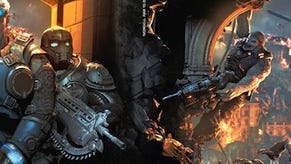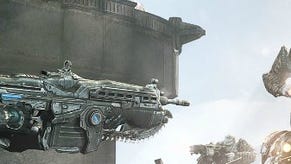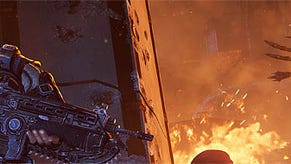Gears of War: Judgment impressions - life, interrupted
Gears of War: Judgment is an attempt to challenge presumptions of the established franchise. VG247's Dave Cook speaks with Epic Games about this tough new direction.
Challenging expectations can be tricky when you're the head of a franchise as established as Gears of War. People know what to expect from the format - cover mechanics, bulky roadie runs, brutal executions and a decayed world riddled with ruin and death.
How then do you even begin to expand a format so ingrained into gamer's subconscious? That difficult task fell to Bulletstorm developer People Can Fly and it has already revealed a few ways in which the format can be expanded without going off-message.
Bigger environments, a tougher challenge and an emphasis on class roles in multiplayer are just a few methods the studio has employed, although they aren't seismic shifts in the template.
It's rare that you'll find the word 'subtle' used in relation to Gears of War, but actually sitting down to play multiplayer reveals that People Can Fly's subtle changes really can make all the difference.
To better understand the collaboration between both parties and their joint approach to the prequel, VG247 spoke with Chris Wynn, senior producer at Epic Games.
Few Things Are Sacred
Gears of War: Judgment is set 14 years before the events of the first game, but rather than create a part-and-parcel experience that simply gave players more of the same, Epic entrusted People Can Fly to look at its franchise from a new perspective.
"They bring a fresher view more than anything," Wynn explained, "at Epic we don't want to keep making Gears games forever, as we've been doing it since 2006. So those guys came in with fresh eyes, fresh ideas, and it was really great."
"They came in and tried a different spin to it that we both felt the series was ready for", Wynn added, "One of the biggest fears was that we'd go stagnant and not take it anywhere, and that's what we didn't want to do."
"So by involving them we can take it into a different space, and that kind of helps us freshen ourselves up too. As we get into more future projects we're going to feel fresher and not doing the same things we've already done."
But rather than keep People Can Fly on the leash and create a safe-bet, Epic wanted to do the exact opposite, and to really use Judgment as a platform for innovation. It's a move that both parties supported and that Epic really wanted to shine through in the end product.
"We're way more willing to push the boundaries more than we have in the past," Wynn stressed, "and to just challenge some things that we may have been scared to touch in the past for fear of losing our audience."
"I think now is the right time to take a few chances, to see where we can go and where we can take it, and where we can do things differently. There are very few things that are sacred in the Gears universe – aside from a few things like, it has to be a third-person shooter."
"As we look at what's really core, what do we not want to change, what do our fans really want, and then everything else is up for grabs," Wynn added.
Life, Interrupted
Although Gears of War: Judgment is a prequel, Epic didn't want to be too predictable and to simply explore the events of Emergence-Day - which, to players who aren't up on their Gears' lore - is the day the Locust menace first appeared on Sera to annihilate humanity.
"We felt that we didn't want to do E-Day because that was too easy," Wynn stressed, "So Judgement is set just after E-Day, 14 years before the first Gears of War. The sense that we wanted to capture in this game was a sense of fear like, 'Holy crap, these big monsters have just started bursting out of Sera', and they've started destroying the planet's inhabitants."
Wynn continued, "And we wanted people to see that through the environments as they run through the game, that sense of life interrupted. Like, people are going about, the Pendulum Wars have just ended, everyone is happy and celebrating, but then the Locust come out of nowhere and just destroy all that, and ruin that peace."
You can see what Wynn is saying while playing Judgment. Locales are still ruined as they are in previous Gears titles, but there is still colour in the world, and sense of what the world must have been like before the Locust waged war on humanity.
Prepare For Pain
Epic has waxed lyrical on Judgment's increased difficulty in the past, so it's no secret that this is by far the most challenging Gears experience to date, and it's clear the seemingly impossible odds levied towards the player are in place to add to that sense of fear.
Wynn explained why both studios went down that route, "It came out of Gears of War 3 and all of our tuning to try and make it more accessible. We kind of lost the challenge because you could play it through start to finish, and never really worry about dying."
"So that took something away from the game," Wynn continued, "You should always be thinking about where you're going to take cover, where you're going to run to and where you're going to shoot first. That kind of went away a little bit."
"But we've brought that intensity back, and it's maybe more in line with the first Gears of War. So you are a little bit scared by the Locust, and it's not like you can just run through and gun everything down. We want you to think, while playing, about how you're going to get through it."
Part of that fear comes with the game's protagonists - Cole and Baird - being younger than the fierce and cocksure warriors we last say in Gears of War 3. They too have been wrenched from their normal lives and thrust into a fearsome new war against enemies they don't yet understand.
"I wouldn't say they're green," Wynn explained, "and straight away we had different writers on the game, so they came at Cole and Baird from a different approach. But it is way before Delta Squad existed, so their characters are a little bit different."
Wynn continued, "You're still going to get that core familiarity. Baird's still the same guy, but he's an officer now, he's a little bit more composed and more cooperative with the team."
"The events of the game sort of build him into the person we know from the trilogy, and that's the same with Cole. He's a little bit more reserved than in the other games as well."
To get a better perspective on the reach of the Locust's campaign to destroy human life on Sera, both developers also opted to make environments bigger, while throwing in multiple ways to approach objectives, and a new engine that respawns enemies in different locations each time.
"The enemies that you face are random," Wynn explained, "and we built this really cool engine where the spawn system that dictates where enemies are in combat randomises every time you go through. If you play and I play, it's going to be different."
"We want people to replay the game," Wynn added, "we don't want you to just play once then put the disc back in its box. We want you to go through it two, three or even four times, because it's going to be a little bit different each time.
Wynn continued, "It also makes it a little more challenging, because you don't want to know when and from where enemies are going to come. So instead of a group of big heavy guys, you might get a bunch of little Tickers, and you have to be on your toes to be flexible."
Prequel To The Sequel
But why this setting, why this time specifically? We ask Wynn if there as ever a desire at Epic to tie up some loose threads of the series , rather than going back to before the start of the trilogy.
"Not really," Wynn stressed, "We always knew we wanted to do a trilogy, that was all we wanted to do. We just wanted to tell that story in three parts, so it was never a situation where we thought, 'OK, the Locust are gone, let's do that story."
"There was a million different ways we could have gone with the universe," Wynn added, "I'd say the two biggest things that the fans wanted were the Pendulum Wars and E-Day. Again, both of those things felt like the easy way for us."
"The Pendulum Wars would have gotten too far away from what Gears of War meant, Wynn explained, "Gears of War is monsters, so if we did human vs human back at that time, it wouldn't have really felt like Gears, so that kind of ruled that part out.
"We then thought, 'where can we go? Can we go between one of the games, we could to a prequel, or a side story'. Baird made a lot of sense to us for a lot of different reasons, so we looked to expand Baird's story, so that prequel made more sense", Wynn added.
We're In This Together
We also played a few rounds of new Gears of War: Judgment mode 'Overun, which sees a team of four COG defending a power generator from a large band of attacking Locust. At half-time, players then switch to the Locust attacking COG soldiers instead.
Overun is a time-based mode that is won by running out the clock. It sounds simple, but without teamwork between each of the COG, and a fluid sync between their specific skills, teams run the risk of falling apart at the seams.
New character Sofia is the medic of the bunch, primed with healing grenades that patch up any battered COG in the vicinity, Baird is the only one capable of repairing broken spike strips and other defences, while Cole can drop ammo crates for his squad.
XP rewards are doled out for playing into those roles, and when playing as the Locust, these roles remain but with subtle little different. For example, Kantus are medics, but rather than hurling a healing grenade, you must chant near wounded allies and stay close to patch them up.
Wynn explained that both studios wanted to take chances with Judgment's multiplayer, just as they have with the campaign, "I'd say we're taking more chances with multiplayer than anywhere else. We haven't got into a ton of details yet. We've shown Overun, and we announced Free-For-All mode, which will change things."
"One of the biggest changes was just that we made things faster and smooth," Wynn added, "We also changed the controls, which is crazy, you never do that to your franchise. We were scared, but we really wanted to do this, but everyone who's played it so far has been surprised by it, and said it was awesome."
"We have other stuff coming in for multiplayer that is just different for Gears. They may be a little risky, but as I said, we wanted to introduce new things to players. They'll see it and they may be a little sceptical at first, but when they get their hands on it they'll be like, 'oh I get why they made that change.'"
Prepare For The Future
We then take the discussion off-road a little, and ask Wynn why Epic - and of course other developers like Capcom, Valve and many more - are opting for collaborations with studios, and buying teams and integrating them into their family.
"It depends on what you want to do," Wynn explained, "the future is kind of crazy right now. We're reaching the end of this console generation and trying to figure out what's coming next, but I mean, who knows?"
"There's a big rise in mobile - but not just in devices - but also because it's cheap to make a game on mobile devices," Wynn added, "So if I want to start a new company, t is really hard to get 20 to 30 million dollars to do a triple-a game. It's almost impossible."
Wynn continued, "Triple-a gaming - which isn't going to go away - has sort of shrunk into a small sub-set of developers, and it's hard for a new developer to get in there. Obviously with Epic, we make the Unreal Engine 4 and one of the big focuses for that is it's easier an cheaper for artists to make games with."
"That's because we don't want to see a trend where team sizes grow, because then it takes more and more money to make triple-a games. If anything I'd like to see more indie games, and Kickstarter has been cool in getting people funding to try out some ideas."
"Some new platforms that are coming out might also help make this possible, so I think you're going to see a focus on getting away from large teams. But also as designers we have to be smarter about how we do things. In games it's seen as standard to deliver story-telling through cinematics.
"Cinematics are frigging expensive, and its almost like funding a movie. In Gears of War 3 we had something like an hour and a half of cinematics. That is a movie that we made, on top of making a game. So that's very costly, very time-consuming, and you have to localise all of that content into like 13 different languages as well."
Unreal Engine 4
So how does Epic prepare for such a volatile and unclear future? Wynn said, "You have to make a lot of guesses about where next-gen is going. is it dynamic lighting or realistic physics? You just have to think about what is going to push game design."
"Our engine always scales down," Wynn continued, "and scalability is always important. We have to make Unreal workable on iPhone, and we always stick to that mentality. We look at it like, 'how do we support creation and creators?"
But do other fringe engines such as CryEngine 3 or Square's Luminous Engine worry Epic? Wynn explained that the studio respects what its competitors do, but they don't give the studio cause for concern.
"I don't think we ever feel beaten by them," Wynn explained, "but we definitely look at other engines to see what they're doing. This is going to sound a little cocky, but sometimes I think that the other engines are trying to go in different directions just to try and compete with Unreal."
"It's like they're trying to find something unique and new. I'd say that the one I look at the most and makes me go 'wow' is Unity, because of what they've been able to do. They've really expanded their tools to be more versatile, and that is really interesting."
"I remember looking at the Crytek tools and thinking, 'yeah, that is as slick as hell, those are sweet tools'. But we never sit down and say, 'wow those guys are beating us, let's change direction.'. We've set our direction, we're going to hit it and I think we're going to keep on competing."















